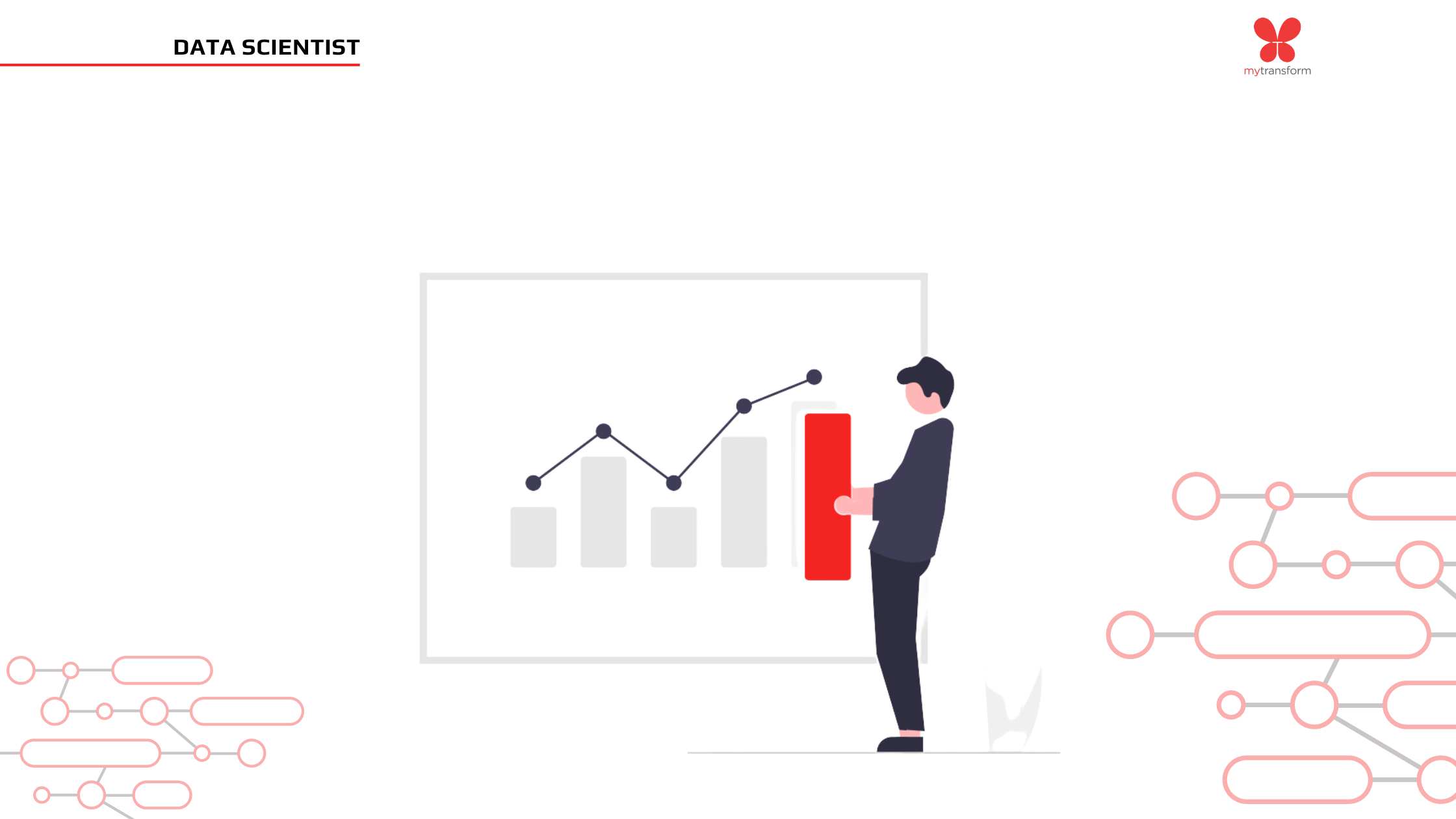
Data is the most important asset of any organization in the world. With businesses openly accepting the technology to solve their operational constraints, data plays a vital role.
With huge volumes of data available, there is a need for a specialist with expertise and capability to handle it which is done by a data scientist.
If you are wondering ‘how to become a data scientist?’, this article will provide all the details about the roles and responsibilities of a data scientist, salary, top colleges for data science, etc.
Data scientists are among the highest-paid professionals in the world and the demand for data science expertise is rising to put the data to work.
Data scientists are responsible for extracting value out of data by analyzing huge caches of raw data available in the organization and helping in making better data-backed decisions.
Though the role of a data scientist is in high demand and pays well compared to the other associated fields, the role has its stress around the profile.
This article will provide all the necessary information about taking a career as a Data scientist.
What is Data Science?
Data science is the study of data which is an interdisciplinary field that uses algorithms, data modeling, and software tools to examine large volumes of data to generate insights, uncover data patterns, and drive business decisions.
It is employed by organizations to create prediction models using advanced machine learning algorithms to sort, organize, and learn from raw structured and unstructured data.
Data scientists should understand business problems and construct questions that can be answered through specific data sets and employ data and advanced analytics to evaluate customer behavior.
Data Analyst Vs Data Scientist – What’s The Difference?
Data analysts in general work with structured data using programming languages, data visualization software, and statistical analysis. Some of the data analyst’s everyday tasks are
-
- Acquire data from different sources.
-
- Clean and reorganize data for analysis.
-
- Collaborate with other teams and stakeholders to identify data and information needs.
-
- Present findings and discoveries in an easy-to-understand way to drive better decisions.
-
- Spot trends and patterns in data and translate them to actionable intelligence.
Data scientists deal with unknown data by employing advanced techniques to make predictions.
They develop models to handle structured and unstructured data and automate using machine learning algorithms and other modeling techniques.
-
- Procure, clean, and process raw data.
-
- Design predictive and prescriptive models and ML algorithms to mine large volumes of data.
-
- Develop tools and programs to monitor and analyze data accuracy.
-
- Build dashboards, visualization tools, and reports.
-
- Automate data collection and processing.
Who Is A Data Scientist?
Data Scientists are professionals who apply advanced analytical and scientific methods to analyze large volumes of data to help organizations make data-driven decisions.
Their main role is to analyze a huge cache of structured and unstructured data to generate insights, train AI systems, etc to drive business decisions.
They bring together the concepts of statistics, analytics, big data, and software engineering to transform raw data into meaningful insight and actionable information.
With growing dependence on technology, businesses are realizing the importance of data and their employment for decision making which will be done by a Data Scientist.
Eligibility For Data Scientist
There is a rise in demand for data scientists owing to the increasing data cache with businesses that can be put into use to drive business decisions.
To take a career as a data scientist, one should consider these steps to become a data scientist:
-
- Take an undergraduate program in data science, software engineering, and associated fields. If possible, pursue a master’s degree in the same.
-
- Learn technical and soft skills related to data science.
-
- Understand the work profile of a data scientist.
-
- Get different data science-related certifications.
What Does a Data Scientist Do – Roles and Responsibilities
The responsibilities of a data scientist depend upon the business models of the organizations.
Though the role of a data scientist is challenging, one gets to be in the front seat of emerging technologies. Here are some of the roles and responsibilities of a data scientist.
1. Data Collection
The data collected by businesses play a vital role in the organization. Different problems need a different set of data to generate insight and solutions. A data scientist has a role define the data sets that need to be collected.
2. Data Preparation and Handling
Handling huge volumes of data requires a data scientist to apply statistical and analytical methods to determine quality data and discard irrelevant ones and structure them for easy understanding.
3. Exploratory Data Analysis
Data scientists apply statistical, analytical, and visualization methods to explore underlying data patterns to understand consumer behavior.
4. Feature Engineering
Data scientists should identify relevant and impactful features from raw data by applying business domain expertise. Performing these will increase the accuracy of ML models.
5. Machine Learning (ML) Model Development
The crucial role of a data scientist is to develop ML models using different programming languages to develop predictive and prescriptive models to train AI and turn data into information in real-time.
6. Communication
Data can be used to generate insights into the business. A data scientist is inherently required to communicate them to other stakeholders in the organization to make better decisions and make strategies for future prospects.
7. Address Business concerns
Most of the time, data will have answers for prevailing problems. Data scientists are expected to provide data-backed solutions for the problems.
Careers In Data Science – Scope
There is high demand for candidates with data science expertise in India. Data science is evolving with new technologies and requires a huge workforce to handle and maintain data structure in technology dependant organizations.
Depending upon different data scientist work profiles, designations in data science are assigned.
1. Data Architect and Administrator
Data Architects create and manage the data frame of the entire organization. The primary objective is to understand the enterprise strategy and the necessary data to be collected.
They work closely with data engineers to build database management systems and upgrade existing infrastructure. They design the flow and processes for data processing.
2. Data Engineer
Data engineers access and process large volumes of data in real time. They interpret unverified and unformatted data across different departments.
They have the responsibility to build data pipelines for further analysis along with setting p the infrastructure to handle huge data requests.
3. Data Analyst
Data Analysts primarily work on raw structured and unstructured data to generate business insights.
They work in partnership with different teams to streamline their data flow along with deriving actionable intelligence.
Their primary role is to clean and study data and create easy-to-understand reposts through visualization tools.
4. Data Scientist
Data scientists analyze data patterns and trends to generate actionable insights to make decisions across departments and organizations.
They play a key role in driving strategic business decisions They are expected to provide the necessary backing for restructuring and adjustment in business processes.
5. Machine Learning Engineer
The combination of Software engineering and data science is a Machine Learning Engineer.
They develop software, ML models, algorithms, and artificial intelligence systems to process data within the organization.
They usually work along with other data science experts to develop sustainable models to handle data.
6. Business IT Analyst
A business IT analyst evaluates industry and market trends and proposes adjustments for changing landscape within the industry.
They analyze a large number of data patterns to spot new channels for product introduction and revenue growth.
Using advanced analytic tools and programming skills, they develop different revenue streams for the growth of the business.
7. Marketing Analyst
They identify changing consumer behaviors and patterns by analyzing analytic data generated through marketing and sales efforts.
Marketing Analysts access large volumes of data collected from different sources and platforms to develop marketing strategies and campaigns.
Skills Required to Become a Data Scientist
The work of a data scientist requires different skills which are mainly technical in nature. Some of the skills needed for a data scientist are
-
- Data science fundamentals
-
- Statistics and Mathematics
-
- Programming languages
-
- Data manipulation and analysis
-
- Data visualization
-
- Big Data and machine learning
-
- Software engineering and model development
-
- Communication
-
- Storytelling skills and curiosity
-
- Structured thinking
Data Scientist Salary
The salary of a data scientist varies based on several factors with entry-level starting from Rs.5lk/annum. Data scientists earn up to Rs.25lk/annum depending on the business domain expertise, work experience, etc.
Top Colleges for Data Science Courses
Though a career in data science is in high demand, the academic approach is budding, and very few institutions offer data science programs.
Here are some of the top institutions offering Data science programs in India.
-
- Indian Institute of Technology, Delhi
6-month certificate program in Data Science and Machine Learning.
-
- Indian Institute of Management, Calcutta
12-month Advanced program in Data Science
-
- Birla Institute of Technology and Science, Pilani
2-year Master’s in Data Science and Engineering and 11-month PG program in AI and ML
-
- Jain Online University
2-year MBA in Data Science & Analytics and MCA in Data Science
-
- Indian Institute of Technology, Chennai
1-2 year Diploma in Data Science
-
- Indian Institute of Technology, Roorkee
12-month Executive PG Certificate Program in Data Science
-
- Amity University Online
3-year BCA in Data Analytics, 2-year MCA in AI and ML, and 2-year MBA in Data Science
-
- Open university Manipal
2-year MBA in Data Science & Analytics and MCA in Data Science
Pros & Cons of a Data Scientist
Pros of Becoming a Data Scientist:
-
- Excellent job prospects and careers growth
-
- Industry versatility by working in multiple domains
-
- Challenging work environment
-
- Highly prestigious and paid career
Cons of Becoming a Data Scientist:
-
- Need to understand business domain along with data
-
- User privacy concerns
-
- Generalist approach without specialization
-
- Need to adapt to the fast-changing landscape
Summary
-
- Data Science is a high-growth career prospect and deals with data to make informed decisions and develop strategies for the growth of an organization.
-
- The role of a data scientist is to apply advanced analytical and scientific methods to analyze large volumes of data to help organizations make data-driven decisions.
-
- Data science is a promising career and has a high potential for growth and is among the highest-paid jobs in India.
-
- Many institutions across India provide certification and graduate programs in Data science which can be the best way the climb the ladder to take data science as a career.
Frequently Asked Questions
Data science is a promising career and offers exceptional growth along with a high salary.
Much of the future will depend on the power of data and data science reduces the complexity involved in translating it into meaningful insight.
Yes, data science is a boring job. But, it has the power to drive business decisions and adjust strategies.
Being a data scientist is a stressful job that needs continued effort to determine trends and patterns.
With the growing demand for data scientists, universities in India are offering bachelor’s programs in data and business analytics. However, Software engineering seems to be the best data scientist qualification for pursuing this profession.
A data scientist specializes in high-level data handling including manipulation, programming, and developing models.
Business analysts are more focussed on understanding day-to-day business performance and creating reports.
An Indian Foreign Service (IFS) officer typically retires at the age of 60.




